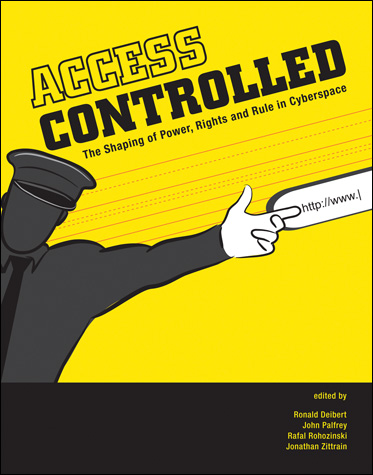Die OpenNet Initiative hat ein neues Buch über Netzzensur und Netzüberwachung herausgebracht mit aktuellen Texten. Das Konzept ist ähnlich wie beim Vorgänger „Access Denied“ (Erschienen 2007): „Access Controlled – The Shaping of Power, Rights, and Rule in Cyberspace“, herausgegeben von Ronald J. Deibert, John G. Palfrey, Rafal Rohozinski und Jonathan Zittrain, kombiniert theoretische Texte mit ausführlichen Hintergründen und Einordnungen von Entwicklungen mit aktuellen Länderreports.
Internet filtering, censorship of Web content, and online surveillance are increasing in scale, scope, and sophistication around the world, in democratic countries as well as in authoritarian states. The first generation of Internet controls consisted largely of building firewalls at key Internet gateways; China’s famous „Great Firewall of China“ is one of the first national Internet filtering systems. Today the new tools for Internet controls that are emerging go beyond mere denial of information. These new techniques, which aim to normalize (or even legalize) Internet control, include targeted viruses and the strategically timed deployment of distributed denial-of-service (DDoS) attacks, surveillance at key points of the Internet’s infrastructure, take-down notices, stringent terms of usage policies, and national information shaping strategies. Access Controlled reports on this new normative terrain.
Da es kaum aktuelle Bücher zum Thema Netzzensur gibt, kann ich einen Kauf nur empfehlen. Das Buch kann man aber auch online lesen. Hier sind einige Kapitel:
Länderreport Deutschland (PDF)
Ron Deibert and Rafal Rohozinski: Beyond Denial: Introducing Next Generation Information Access Controls (PDF)
Nart Villeneuve: Barriers to cooperation: An analysis of the origins of international efforts to protect children online (PDF)
Hal Roberts and John Palfrey: The EU Data Retention Directive in an Era of Internet Surveillance (PDF)






0 Ergänzungen
Dieser Artikel ist älter als ein Jahr, daher sind die Ergänzungen geschlossen.